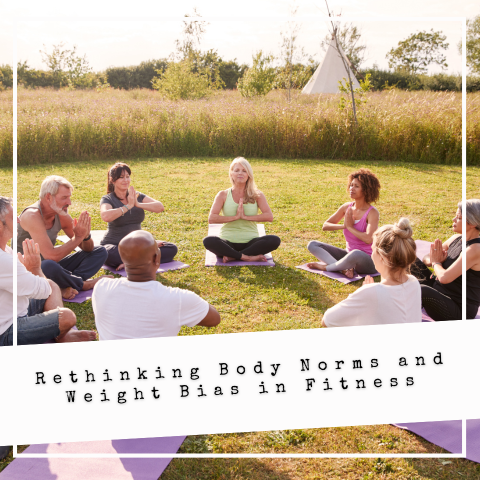Submitted by Melissa Vidito on

By Dolly Stokes, FiTOUR®
The fitness industry, like many others, has long struggled with issues related to the range of body types and weight bias. It's vital to recognize that fitness is not a one-size-fits-all journey and that regardless of body type or weight, everyone deserves to be treated with respect and dignity. By acknowledging and addressing biases we may have, we can foster a more inclusive environment that promotes overall wellness, and we can make needed adjustments in our thinking and behavior.
Recognizing how societal standards and media portrayals shape a narrow definition of what a fit and healthy body looks like is essential. These ideals often promote unrealistic expectations and reinforce harmful stereotypes. As a result, weight bias can show up in subtle, often unconscious ways—even among well-meaning fitness professionals—leading to assumptions or judgments based on a person's size or shape. This bias can negatively impact a client’s motivation, self-esteem, and overall experience within fitness spaces.
It is essential for us to recognize and actively counteract these biases. One step that can be taken is to be mindful of the language we use. We should avoid terms that perpetuate weight bias and instead focus on positive, empowering language by encouraging clients to appreciate their bodies for what they can do rather than how they look.
By fostering a mindset of acceptance and understanding, fitness professionals can help their clients build a positive relationship with their bodies and their individual fitness journeys. This endeavor extends beyond physical exercise to encompass mental and emotional well-being, emphasizing the wholistic nature of health.
By adopting an integrated approach to health and fitness, we can support our clients in achieving their wellness goals without perpetuating harmful stereotypes. This includes prioritizing mental and emotional well-being alongside physical health, recognizing that true fitness encompasses more than just outward appearance.
For instance, we can incorporate tools designed to help clients focus on comprehensive wellness rather than solely on weight loss or body size. This can include a focus on nurturing various aspects of well-being, including physical, intellectual, and emotional dimensions, thereby promoting a balanced and sustainable path to lifelong health.
The Eight Dimensions of Wellness Workbook is an excellent resource to help your clients focus on a wide variety of aspects of overall wellness: (1) physical, (2) intellectual, (3) spiritual, (4) emotional, (5) social, (6) occupational, (7) environmental, and (8) financial. Incorporating all of these wellness dimensions can help us to offer a balanced and sustainable path for our clients to achieving their goals for lifelong health. This workbook is available through study of FiTOUR®’s Active Aging Primary course and is also a focus in the weight bias section of the FiTOUR® Professional Ethics, Conduct & Business Practices course.
Fitness professionals are poised to work for positive change in our industry. In addition to working towards eliminating weight bias that is often seen in facilities, marketing, and programming, fitness professionals can make a concerted effort to focus on promoting overall wellness. Overall wellness programs that incorporate mental, emotional, and social health alongside physical training can significantly enhance the quality of life for our clients and thereby reduce the potential for biases based on body size and ability.
Through the adoption of a wholistic perspective that focuses on overall wellness, we can help our clients develop a positive relationship with their bodies, nurture their mental and emotional well-being, and foster a culture of inclusivity and respect.
For more information on how to combat weight bias and other biases seen in the fitness industry, the FiTOUR® Professional Ethics, Conduct & Business Practices course provides detailed information on the impacts of a variety of biases such as racism, ageism, and discrimination against individuals due to gender or sexual orientation, as well as discrimination against the physically and mentally handicapped. Completion of this study course will provide you with the knowledge and tools needed to create supportive and non-discriminatory environments for your clients.
With over 30 years’ experience as a fitness pro, Dolly is certified through AFAA, ACE, NASM, IDEA, and FiTOUR®. A FiTOUR® ProTrainer since 2002 she has authored 12 FiTOUR® certification courses, most recently the FiTOUR® Active Aging Primary and Advanced courses; and co-authored the FiTOUR® Professional Ethics, Conduct & Business Practices course. Dolly has presented at IDEA World and was a PFP 2019 Trainer of Month. She owns StokesMethod Studio in Fairhope, AL.
